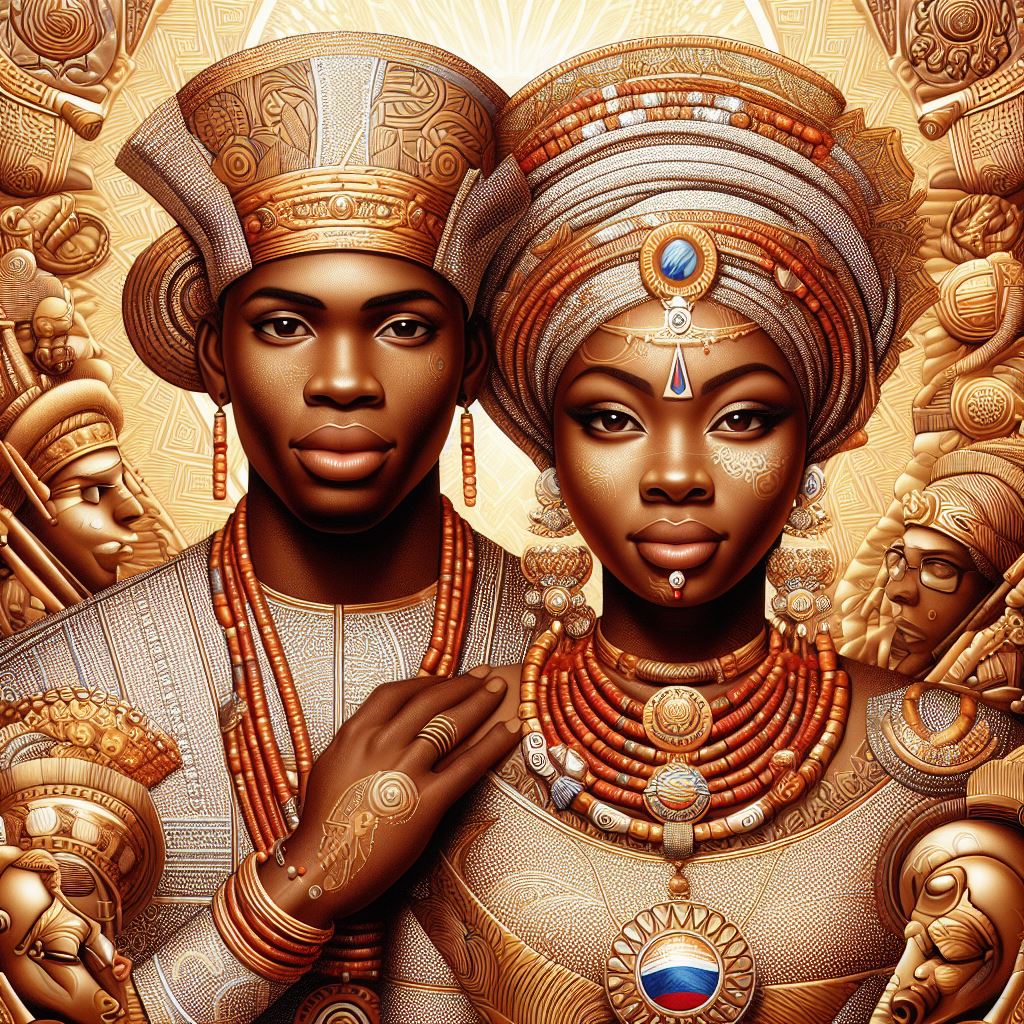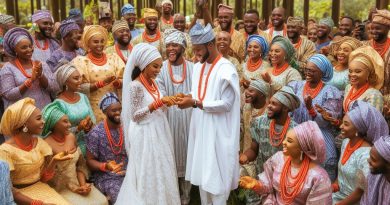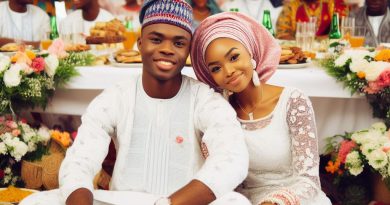The Cultural Significance of Marriage in Nigeria
Last Updated on January 28, 2024
Introduction
- In Nigeria, marriage signifies community values and traditions.
- Nigerian culture deeply embeds marriage, rich in customs and rituals passed through generations.
- Marriage’s vast cultural significance molds multiple aspects of life in Nigeria.
Marriage in Nigeria surpasses a legal bond. It encompasses love, unity, and heritage celebration.
To marry in Nigeria, cultural considerations are essential. Nigerian marriage symbolizes the unification of families and their shared histories.
This cultural significance becomes evident through elaborate ceremonies and rituals.
From traditional engagements to the main wedding, meticulous planning honors the couple and families.
Communities join in, celebrating the union with blessings and festivities.
Marriage also impacts Nigeria’s societal and economic aspects.
It marks adulthood, and unmarried individuals past a certain age may face societal pressures.
Marriages can strengthen social ties and family alliances, enhancing community influence.
Nigerian marriage intertwines with religious and spiritual beliefs.
Many view it as a sacred institution ordained by a higher power.
As a result, weddings often occur in places of worship, featuring religious ceremonies and blessings.
In summary, Nigerian marriage carries profound cultural importance.
It represents heritage, community, and shared values. Ceremonies, traditions, and societal expectations encompassing marriage influence various aspects of life in Nigeria, solidifying its place in the culture.
Traditional Marriage Practices
Description: Explore the traditional practices associated with marriage in Nigeria
In Nigeria, marriage is not just a union between two individuals; it is a significant event that involves families, communities, and the entire society.
The traditional marriage practices in Nigeria are deeply rooted in cultural beliefs and customs, making them an integral part of the country’s rich heritage.
1. Preliminary arrangements
Before a marriage can take place in Nigeria, there are several preliminary arrangements that must be made.
These arrangements are typically initiated by the families of the bride and groom.
Matrimonial negotiations often involve elders and representatives from both families, who meet to discuss the union.
The purpose of these negotiations is to establish compatibility between the families and ensure that there are no obstacles or conflicts that could jeopardize the marriage.
This process is considered essential as it sets the foundation for a harmonious and successful union.
2. Bridal price and negotiation
One of the most prominent aspects of traditional marriage in Nigeria is the payment of a bride price.
The bride price is an amount of money, goods, or services that the groom and his family present to the bride’s family as a token of appreciation and respect.
This practice holds great significance as it symbolizes the groom’s commitment and responsibility towards his bride and her family.
It is also seen as a way of recognizing the bride’s worth and ensuring that she will be taken care of within her new family.
During the negotiation process, the bride’s family may express their expectations and desires regarding the bride price.
This negotiation can be a delicate and intricate process, involving discussions on the groom’s character, financial stability, and intentions towards the bride.
3. Ceremonies and rituals
Traditional Nigerian wedding ceremonies are vibrant, colorful, and filled with various rituals and customs.
These ceremonies aim to celebrate the union and seek blessings from the ancestors and deities.
Depending on the ethnic group, specific rituals and ceremonies may vary.
However, common elements include a formal introduction of the couple, exchange of gifts and blessings, traditional dances, and the pouring of libations to honor ancestors.
Marriage ceremonies in Nigeria are not just about the couple; they are communal events that bring families and even entire communities together. It is an opportunity for people to celebrate, showcase their cultural heritage, and strengthen social ties.
Basically, traditional marriage practices in Nigeria play a vital role in preserving cultural values and strengthening family bonds.
From the preliminary arrangements to the bride price negotiation and the elaborate wedding ceremonies, these traditions reflect the importance of unity, respect, and cultural identity.
Despite the influence of modernization, Nigerians continue to embrace and value their traditional marriage practices, ensuring that they live on for generations to come.
Read: Top 10 Marriage Counselors in Lagos: A Comprehensive Review
Marriage as a Unifier of Families and Communities
Role of Extended Families
In Nigeria, marriage is not just the union of two individuals but a bond that extends to their families.
Extended families are at the heart of Nigerian society, and marriage plays a pivotal role in strengthening these family bonds and relationships.
The joining of two families through matrimony creates a sense of unity and solidarity that goes beyond the couple.
It fosters a support system where families come together to celebrate, share responsibilities, and provide emotional and financial assistance.
This interconnectedness is not limited to the wedding day but continues throughout the couple’s married life, reinforcing the concept of “family first.”
Community Involvement
Nigerian communities are vibrant and close-knit, and weddings are a testament to this communal spirit.
The entire community actively participates in wedding festivities, making it a grand celebration.
From elders offering blessings and advice to friends and neighbors contributing to the planning and execution of the event, weddings are a communal effort.
Community involvement goes beyond the ceremonial aspects; it reflects the unity and togetherness that marriage brings to Nigerian society.
These celebrations not only strengthen the couple’s bond but also reinforce the bonds between families and the community.
Economic Implications
Marriage in Nigeria is not just a social event; it also carries significant economic implications.
When two individuals marry, it represents the coming together of two economic entities.
Families often engage in economic exchanges and alliances during the marriage process.
This may include the exchange of gifts, payment of dowry, and financial arrangements that contribute to the couple’s financial security.
Additionally, the economic exchanges between families foster a sense of trust and cooperation, creating a web of financial support that extends well beyond the wedding.
In this way, marriage in Nigeria is not only a celebration of love but also an economic contract that strengthens inter-family relationships and ensures the financial well-being of the couple.
Therefore, marriage in Nigeria transcends individual unions to become a unifying force that strengthens extended families and communities.
It involves active community participation and carries economic implications that foster financial cooperation and alliances between families.
Read: Renewing Your Marriage Vows: When & Why in Nigeria
Marriage and Gender Roles in Nigeria
Roles within marriage
- Traditional gender roles and expectations play a significant role in Nigerian marriages.
- Men are expected to be the breadwinners and decision-makers in the household.
- Women are typically responsible for domestic chores, child-rearing, and maintaining harmony in the family.
- Gender roles are deeply ingrained in Nigerian culture and are often reinforced by societal expectations.
Impact on women
- Traditional gender norms place several challenges on women within Nigerian marriages.
- Women may face limited opportunities for education, career advancement, and personal autonomy.
- They are often expected to prioritize their husband’s needs and sacrifice their own aspirations.
- Gender inequality can lead to women feeling suppressed, unfulfilled, and deprived of their rights.
Shifting dynamics
- In recent years, there has been a gradual shift in gender dynamics within Nigerian marriages.
- Education and urbanization have contributed to increased awareness and questioning of traditional roles.
- Many women are pursuing higher education, entering the workforce, and striving for independence.
- Men are also adapting to these changing dynamics, becoming more involved in domestic responsibilities.
- Mutual respect and negotiation are becoming essential components of modern Nigerian marriages.
- There is a growing recognition that gender equality benefits both partners and strengthens family dynamics.
In short, traditional gender roles and expectations have long been influential in Nigerian marriages, with men assuming decision-making and breadwinning roles while women prioritize domestic responsibilities.
However, such norms have presented numerous challenges for women, limiting their personal growth and autonomy.
Fortunately, Nigerian society is witnessing a transformation in gender dynamics.
Education, urbanization, and increased awareness have led to women seeking empowerment, pursuing education and careers, and challenging traditional gender norms.
Men are also adapting to these changing dynamics, becoming more involved in household responsibilities and embracing equal partnerships.
As gender equality becomes more recognized, Nigerian marriages are experiencing a shift towards mutual respect and cooperation.
This transformation not only benefits individual couples but also strengthens the fabric of Nigerian society as a whole.
Read: The Role of Religion in Marriage Counseling in Nigeria

You Might Also Like: Marriage and Respect: Honouring Your Partner in Everyday Life
Marriage as a Rite of Passage and Social Status
Symbol of adulthood: Explore how marriage signifies a person’s transition into adulthood
Marriage in Nigeria carries immense cultural significance, symbolizing the transition from youth to adulthood.
It marks a significant milestone in one’s life, representing maturity, responsibility, and readiness to build a family.
In many Nigerian communities, the expectations of adulthood are heavily tied to marriage, and individuals who are unmarried are often considered as not fully grown up.
For both men and women, marriage is seen as a way to establish their independence, demonstrate their ability to take care of themselves, and contribute to the larger society.
Marriage serves as evidence that an individual is ready to fulfill their duties as a spouse, parent, and community member.
It is a visible sign that they have reached a certain stage in life and are prepared to navigate the challenges and responsibilities that come with it.
Prestige and social recognition: Explain how being married enhances one’s social standing in Nigerian society
In Nigerian society, being married brings prestige and social recognition, elevating an individual’s social status.
Marriage is often seen as an accomplishment and a reflection of personal success.
It signifies that an individual has met societal expectations, gained the approval of their community, and achieved a certain level of stability and maturity.
Married individuals are generally accorded more respect and receive higher social standing compared to their unmarried counterparts.
They are seen as responsible, reliable, and trustworthy. In some cases, marriage is also associated with financial stability, as it implies that the individual has established a household and has the means to support a family.
This social recognition and respect can lead to increased influence and opportunities within the community.
Pressure to marry: Discuss the societal pressure to marry and the implications it has on individuals
In Nigerian society, there is often significant societal pressure to marry, which can have various implications on individuals.
This pressure stems from cultural norms, family expectations, and traditional beliefs surrounding marriage.
Individuals, especially women, are often expected to marry at a certain age and fulfill certain societal roles.
The pressure to marry can impact individuals emotionally and mentally, as they may feel inadequate or like they are not meeting the expectations set by their community.
It can lead to feelings of anxiety, stress, and depression, particularly when individuals struggle to find a suitable partner or are not ready for marriage.
Furthermore, the pressure to marry can also result in individuals rushing into marriages that may not be ideal or fulfilling.
The focus becomes more on fulfilling societal expectations rather than personal compatibility or happiness.
This can lead to failed marriages, unhappiness, and even perpetuate harmful gender stereotypes and unequal power dynamics.
It is essential to recognize and respect an individual’s autonomy in choosing if and when to marry.
Encouraging a more inclusive and accepting approach towards marriage can help alleviate the societal pressure and enable individuals to make choices based on their own desires and needs.
Read: Benefits of a God-Centered Marriage: Insights from Hebrews 13:4
Challenges and Evolving Perspectives on Marriage
Influence of modernization
- Western influences and globalization are reshaping marriage in Nigeria.
- Traditional practices are being replaced by more modern and Westernized ideas.
- Globalization has brought new ideas about romance, love, and relationships to Nigeria.
- People are increasingly looking for love and companionship in their marriages.
- Marriage is seen as a way to find happiness and personal fulfillment.
Changing expectations
- Nigerian youth are redefining traditional marriage practices.
- They are questioning the importance of arranged marriages and dowry payments.
- Many are opting for love marriages and choosing their own partners.
- Education and exposure to the outside world have influenced these changing perspectives.
- Young Nigerians want to have a say in their own futures and whom they marry.
Issues of compatibility
- The challenges faced when balancing cultural expectations with personal preferences.
- Traditional Nigerian families expect their children to marry within their tribe or ethnic group.
- However, personal preferences often lead individuals to choose partners from different backgrounds.
- Interethnic marriages are becoming more common in Nigeria, leading to cultural mixing and hybridization.
- There is a struggle to find a balance between cultural identity and individual happiness.
Overall, marriage in Nigeria is evolving due to the influence of modernization and changing expectations.
Young Nigerians are challenging traditional practices and seeking love and compatibility in their marriages.
This shift can be attributed to Western influences, globalization, increased education, and exposure to different cultures.
However, there are still challenges when trying to balance cultural expectations with personal preferences.
Nigerians are grappling with the tension between maintaining their cultural identity while pursuing individual happiness.
Marriage in Nigeria continues to be an important institution, but it is being redefined in the face of societal changes.
Discover More: Intercultural Marriages and the Nigerian Legal Framework
Find Out More: The Art of Crafting Personal Marriage Messages
Conclusion
Recap the Cultural Significance of Marriage in Nigeria
In Nigeria, marriage stands as a profound cultural cornerstone, uniting families and communities.
Marriage signifies heritage, bridging past and future, celebrating love, unity, and shared traditions.
It reflects rich cultural diversity, with various ethnic groups showcasing unique customs, ceremonies, and rituals.
Emphasize the Importance of Preserving and Adapting Cultural Traditions
Preserving these customs amidst change ensures the endurance of Nigeria’s vibrant cultural tapestry.
Adaptation allows traditions to thrive in contemporary contexts, harmonizing heritage with modern lifestyles.
It fosters a sense of identity, pride, and belonging, fostering a resilient cultural heritage for future generations.
Encourage Further Exploration and Understanding of Nigerian Marriage Customs
Exploring Nigeria’s diverse marriage customs deepens global understanding of this rich cultural mosaic.
By delving into these traditions, we embrace unity in diversity, fostering mutual respect and appreciation worldwide.
Let’s continue this enriching journey, celebrating the timeless essence of Nigerian marriage customs and their enduring significance.


